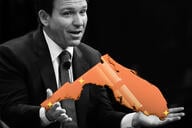You have /5 articles left.
Sign up for a free account or log in.

Joseph Shepard resigned from Western New Mexico University in December after inking a lucrative severance agreement.
Photo illustration by Justin Morrison/Inside Higher Ed | rawpixel | choness/iStock/Getty Images
Faculty at Western New Mexico University are seething and lawmakers want all members of the Board of Regents to resign after they handed President Joseph Shepard a $1.9 million exit package when his contract was terminated last month amid a spending scandal. Additional fringe benefits bring the deal to an estimated $3.5 million.
State officials have decried the deal as a “golden parachute” for the outgoing president, who was accused of spending more than $360,000 of taxpayer funds on international travel, lavish resorts and stocking his campus home with furniture. Attorney General Raúl Torrez filed an emergency motion Monday to stop the university from disbursing severance payments.
“This payment is an egregious misuse of public funds and a betrayal of the Board’s responsibility to act in the best interest of the university and its students,” Torrez said in a Monday news release. “Dr. Shepard voluntarily resigned, and the Board had ample opportunity to negotiate a reasonable or no-cost separation agreement. Instead, they chose to pledge nearly $2 million in taxpayer money without justification or consideration of the public good.”
When his contract was terminated at a December meeting—a move both parties cast as a mutual decision despite the unwinding scandal—regents heaped money and praise on Shepard amid his exit.
“He is selflessly stepping down for the good of the university in the face of ongoing issues,” Board President Mary Hotvedt said at the Dec. 20 meeting while ticking off his accomplishments.
Shepard denied any wrongdoing, casting his critics as dishonest in a resignation letter that began, “A lie is halfway round the world before the truth has got its boots on.” He framed his ouster, which comes after 13 years on the job, as driven by “toxic” outside forces.
“To those of you who are against me, I hope you someday find peace. My choice is to move beyond the toxic and back to the center of compassion,” Shepard said upon his resignation at the board meeting.
(Asked for comment, WNMU directed Inside Higher Ed to Shepard’s resignation letter. Shepard did not respond to an emailed request for comment.)
Amid the fallout, state officials want an investigation and Democratic governor Michelle Lujan Grisham has demanded the resignation of the entire board. Two members have already acquiesced, including Hotvedt, and others intend to follow, according to local media reports.
Additionally, WNMU’s Faculty Senate voted no confidence in the board last week.
Questionable Spending
Searchlight New Mexico first raised questions about Shepard’s spending in 2023. The news outlet found Shepard had taken lengthy trips to Greece, Spain and Zambia to recruit international students, though fewer than 100 of WNMU’s 3,500 students hailed from abroad in 2023. More than a third of those students came from Mexico, with the border three hours away.
Shepard also spent $12,000 to lease a home in Santa Fe, the state capital, for two months. And he furnished his campus home with a reported spending spree of $27,740, justifying the expenditures as the cost of doing business, arguing potential donors who visited his campus home were accustomed to “the finer things in life,” he told Searchlight New Mexico. Shepard has subsequently suggested that the narrative has been twisted, noting in his resignation letter that “there is no $27,000 couch” but rather that he spent $4,500 on one couch and bought two more for $5,500 each.
A state report on the heels of Searchlight New Mexico’s investigation raised more concerns.
The Office of the State Auditor said its review, which spanned July 1, 2018, through June 30, 2023, indicated that WNMU “engaged in the waste of public funds” through “excessive or extravagant domestic and international travel and lodging for the university staff, leadership, and governance.” The report also found “improper use of procurement and university credit cards … including the procuring of high-end custom furnishings for the university president’s official residence; and providing expense accounts and purchasing cards to a non-university employee.” The state report noted multiple instances of expenses lacking documentation and cases in which travel by the president appeared to be “unrelated to official university business.”
The report was released in November, just one month before Shepard stepped down. The State Ethics Commission has also opened an investigation to determine any wrongdoing at WNMU.
Although not mentioned by name in the state report, spending by Shepard’s wife—Valerie Plame—on university accounts also raised concerns. Plame, a former CIA operative who achieved notoriety due to a CIA leak during the George W. Bush administration, racked up several thousand dollars in expenses reimbursed by WNMU, according to Searchlight New Mexico.
Shepard has defended his wife’s spending amid scrutiny, writing in his resignation letter that Plame never “profited handsomely” and that all of her expenditures were for university purposes.
An Unusual Exit Agreement
Judith Wilde, a research professor at George Mason University who studies presidential compensation and contracts, estimates that the value of Shepard’s exit agreement is in the neighborhood of $3.5 million considering the various perks beyond his base salary of $365,000.
She notes, for example, an annual retention bonus of 20 percent with no stated goals, which she also finds uncommon.
“When I compare this to over 200 contracts that we’ve looked at, this is well beyond the norm,” Wilde said, noting that she shared the governor’s concerns about “fiduciary mismanagement.”
Had the board simply terminated Shepard’s agreement without cause, he would have been subject to a maximum payout of just under $550,000, according to a copy of his contract shared by Wilde. Instead, Wilde points out that Shepard is “getting three and a half times that amount.”
Wilde added a common factor that drives up the cost of exit agreements is the buyout of tenure rights. But Shepard did not have tenure, which should have kept that figure down, she said.
The deal also bestows president emeritus status on Shepard.
Additionally, the exit agreement created a faculty position for Shepard that did not exist in his prior contract. Under the new deal, he will be required to teach six credit hours over a year. Shepard will also receive an eight-month sabbatical and be allowed to teach remotely.
Torrez, the state attorney general, announced an investigation into the deal. (Wilde, a New Mexico resident, said she encouraged state officials to look into the matter further.)
Phillip Schoenberg, president of the WNMU Faculty Senate, also balked at the lucrative agreement, telling Inside Higher Ed by email that concerns about the contract prompted the no-confidence vote in the board. He called the deal “highly inappropriate” and said he believes the board should have waited until an investigation was finished before reaching a severance agreement.
He added that the Faculty Senate no longer trusts the current board’s judgment.
Schoenberg also expressed concern about Shepard joining WNMU’s School of Business, writing that colleagues in that department “were not consulted about the faculty appointment.”
While the deal has riled faculty members and state lawmakers, Wilde suggests it will likely remain in place, even if the full board resigns and is replaced by new gubernatorial appointees. She noted that if trustees “attempt to nullify the agreement,” then Shepard will likely sue, and a clause in his exit agreement grants him legal counsel of his choice paid for by the university.
“If he sues, it’s likely the university may have to pay for his suit,” Wilde said.




